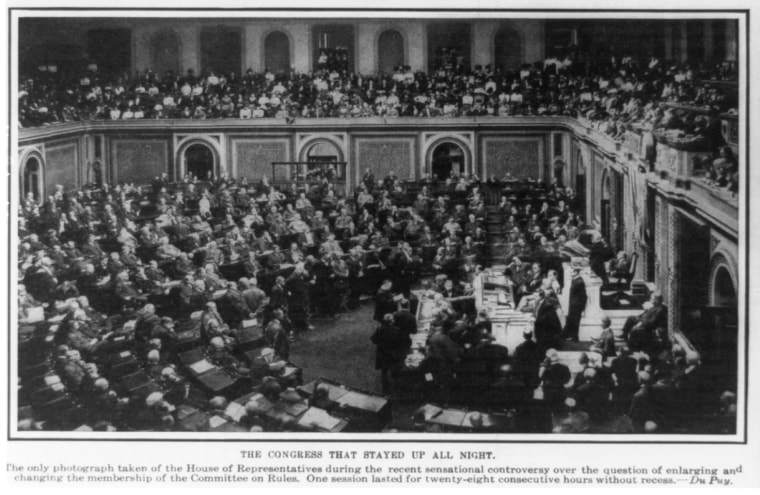WASHINGTON — House Speaker Mike Johnson, R-La., is facing a threat that some of his Republican predecessors can identify with: members of his own party vowing to remove him from power.
Although Johnson’s predecessor, Kevin McCarthy, R-Calif., became the first speaker voted out of office last October and John Boehner, R-Ohio, dropped out amid threats of possible impeachment in 2015, it was a Republican speaker for over 100 years. years ago that he first faced an intra-party revolt against his leadership.
Joseph Cannon, known as “Uncle Joe,” governed the House from 1903 to 1911 and is now the namesake of one of the Capitol’s office buildings. During his term, the Illinois Republican clashed with the growing progressive movement within his party; a tension that turned into a fight over the future of the speaker’s role.
With Rep. Marjorie Taylor Greene, R-Ga., saying she will force a vote next week on Johnson’s ouster, here’s a look back at how Cannon faced down his own Republican rebels in 1910, calling for a vote to remove himself.
Full control of the ‘Tsar’ Cannon
Although the U.S. Constitution specifically names the position of speaker of the House, only States that the Chamber “will choose its president”. And that. As a result, job responsibilities have developed and transformed over time depending on who wields the hammer.
By the time Cannon came to power, the role of speaker had passed from a president to a powerful party leader. The speaker appointed all the committee chairmen and himself chaired the Rules Committee, which directs the flow of legislation to the House floor.
Cannon’s control was so notoriously tight that he was called a “Tsar” Cannon. In his 1964 book “Mr. Speaker: Four Men Who Shaped the United States House of Representatives,” biographer Booth Mooney tells of a voter who asked his representative for a copy of the House rules, only to receive a photograph of Cannon in return.
Although Cannon was very popular among his peers, he clashed with Republican progressives. These members “introduced foolish or unconstitutional bills, not with the slightest hope that they would become law, but simply to cater to a demagogic or ignorant element” and blame it, Cannon said, according to “Uncle Joe Cannon: The Story of a Pioneer American,” which was written by his secretary, L. White Busbey. This friction reached its peak in March 1910.
The revolt of 1910
It all started with a census bill. On St. Patrick’s Day in 1910, Rep. Edgar Crumpacker, R-Ind., took to the House floor to say that he had a “privilege resolution” related to the census. Matters considered privileged take precedence over other legislative matters in plenary. But the debate over the census resolution was soon overshadowed when Rep. George Norris, R-Nebraska, a leading progressive Republican, stood up to speak.
“Mr. President, I present a resolution privileged by the Constitution,” the Nebraskan he said.
When directed by Cannon to present it, Norris read his proposal to reorganize the Rules Committee, expanding its membership and expelling the speaker from it. This would be a huge blow to Cannon’s power.
Representative John Dalzell, a Republican from Pennsylvania, immediately interrupted to say that Norris’ resolution was not privileged. Cannon chose not to immediately comment on this issue, so days of intense debate ensued. The House galleries packed with spectators and reporters occupied every seat available to them, according to newspaper accounts.
“Speaker Cannon is fighting the battle of his life,” noted The Washington Times on the evening of March 18, as the debate continued. “If he loses that, he will be discouraged.”

For those who were unable to see the proceedings in person, newspapers across the country followed the events closely, with headlines such as “The staggering tyrant”, “Make war on Uncle Joe,” It is “Doomed speaker cannon.” Even President William Howard Taft was fascinated by press reports of the fight, according to United Press reportswhich said he “eagerly devoured the details of the anti-cannon fight.”
Eventually, Cannon had to make a decision about whether Norris’ resolution to change the Rules Committee met the criteria for being “privileged.” On March 19, after two days of intense debate, Cannon said no. In a rebuke of his authority, the House voted to reject him and, after further debate, adopted the change in the Rules Committee.
“Canonism was dead, dead as a doornail,” said the speaker in Busbey’s book. But Cannon wasn’t finished yet.
Cannon calls his opponent’s bluff
When Norris decided to close, Cannon asked for a moment to speak. O speaker addressed the chambersaying he had two options: resign or declare a vacancy in the position of Speaker of the House and let this new majority coalition of Republicans and progressive Democrats choose his replacement.
Cannon said resignation was out of the question because it would be a “confession of weakness or error or an apology for past actions” when he was “not conscious of having committed any political error.” The Republican side of the House erupted in applause.
Then Cannon put the Republican rebels to the test. He said he welcomed a vote to expel him from office. One Democrat went ahead and called for such a vote.
When given the opportunity to remove Cannon, the progressive insurgents refused. Only nine voted to remove him, so the vote failed 155-192, with eight members voting “present” and 33 not voting.
“His scepter is taken away, the cannon is left on the throne,” is like Sunday’s star in Washington, D.C., he summarized.
Cannon would later say in Busbey’s book that that day “the position of speaker was taken from me amid the rejoicing of my enemies, and then it was returned to me.”
Although Cannon remained speaker for the rest of the session, control of the chamber passed to the Democrats after the 1910 midterm elections. He chose not to serve as minority leader, but remained in Congress until 1923when he retired two months before his 87th birthday.
This story originally appeared on NBCNews.com read the full story


































